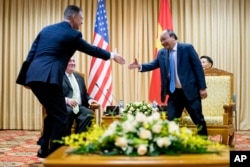The job of the U.S. ambassador in Hanoi is to represent American interests in Vietnam. Next month, the ambassador will try something new. He plans to take Vietnamese businesses to the United States.
Daniel J. Kritenbrink is the U.S. ambassador to Vietnam. He and his team have been asking Vietnamese companies to send a business group to Washington, D.C.
“Investing in the United States is one of the best decisions that Vietnamese firms can make, especially as the country’s economy continues to…expand,” Kritenbrink said.
Over the past year, U.S. embassy officials have been holding events in Hanoi and Ho Chi Minh City for Vietnamese businesses. Their goal is to persuade the companies to send representatives on the trip, which is planned for June 10 to 12.
The idea for the business delegation comes as Vietnam’s economy is expanding. Many companies are considering if the time has come for them to expand overseas.
For the past 20 years, Vietnam has built a big presence as an export powerhouse. And, as Kritenbrink noted, the United States is the biggest market for those exports.
But many Vietnamese think the country’s businesses should take it to the next step. Instead of just shipping products overseas, they want companies to set up operations and offices around the world.
Some companies have already begun expanding. The electronics business FPT has opened up in Japan and the telecommunications company Viettel is serving markets from Burundi to Peru.
Smaller businesses are also considering the expansion idea. Saigon Innovation Hub, Sihub, announced a program last year to provide support to start-up companies that want to go overseas. The program is named ‘Runway to the World.’
Sihub wants “to gather all local and international resources to realize the…mission of boosting economic growth,” Huynh Kim Tuoc said. He is the managing director of Sihub, which is under the Ho Chi Minh City Department of Science and Technology.
Supporters say international expansion is the next step in the development of businesses in Vietnam. In the 1980s, the Communist government started permitting a market economy to grow.
In the 1990s, the U.S. government lifted its trade restrictions on the country. Vietnam joined the World Trade Organization in the early 2000s. It is now a leading exporter of rice, clothing and telephones to the international market.
Vietnam is still reporting increases in its Gross Domestic Product, foreign direct investment (FDI) and FDI-driven manufacturing.
“We are seeing an increasing number of local electronics players expressing interest to venture overseas for growth," said Standard Chartered Bank official Nirukt Sapru.
But there could be problems.
Some observers worry that the growing trade war between China and the United States could hurt Vietnam’s exports. If China’s economy slows down a lot, Vietnamese exports to that country will fall. Others worry about U.S. President Donald Trump’s other tariff fights with countries like Japan and the European Union.
Vietnamese companies hope that going international will both protect their home economy from foreign trade tensions and help build Vietnam’s national brand.
I’m Susan Shand.
Ha Nguyen reported this story for VOANews.com. Susan Shand adapted the report for Learning English. The editor was George Grow.
Write to us in the Comments Section or on our Facebook page. _______________________________________________________________
Words in This Story
resource – n. something that a country has and can use to increase its wealth
mission – n. a task or job that someone is given to do
Gross Domestic Product (GDP) – n. the total value of the goods and services produced by the people of a nation during a year not including the value of income earned in foreign countries
venture – n. an undertaking that is new or different that usually involves risk
tariff – n. a tax on goods coming into or leaving a country
brand – n. particular kind or type of something






